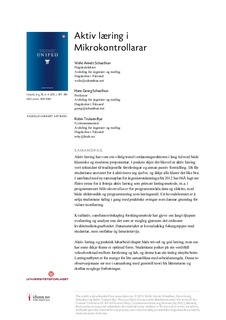| dc.description.abstract | Aktiv læring har vore ein viktig trend i utdanningssektoren i lang tid med både klassiske og moderne proponentar. I praksis skjer det likevel at aktiv læring vert sekundær til tradisjonelle førelesingar og annan passiv formidling. Då får studentane ansvaret for å aktivisera seg sjølve, og ikkje alle klarer det like bra.
I samband med ny rammeplan for ingeniørutdanninga frå 2012 har HiÅ lagt om fleire emne for å fremja aktiv læring som primær læringsmetode, m.a. i programemnet Mikrokontrollarar for programområda data og elektro, med både elektronikk og programmering som læringsmål. Eit hovudelement er å setja studentane tidleg i gang med praktiske øvingar som dannar grunnlag for vidare teorilæring.
Kvalitativ, samfunnsvitskapleg forskingsmetode har gjeve oss langt djupare evaluering og analyse enn det som er mogleg gjennom det ordinære kvalitetssikringsarbeidet. Datamaterialet er hovudsakleg fokusgrupper med studentar, men omfattar òg lærarintervju.
Aktiv læring og praktisk labarbeid skaper både trivsel og god læring, men me har enno ikkje funne ei optimal form. Studentane peiker på ein verdifull vekselverknad mellom førelesing og lab, og denne kan ein truleg utnytta betre. Læringsutbytet er for mange for lite samanlikna med arbeidsmengda. Desse to observasjonane ser me i samanheng med generell teori frå litteraturen og drøftar moglege forbetringar.
Nøkkelord: Aktiv læring, fokusgruppe, dataingeniør, automasjonsingeniør, evaluering, labøving.
ABSTRACT
Active learning has been an important trend for a long time. Even so, it commonly becomes secondary to traditional lectures and transmission teaching. Thus, the students are responsible for their own activity and not everyone succeeds.
At the introduction of the new national framework regulations for engineering education in 2012, Aalesund University College has restructured several taught modules to emphasise active learning as primary mode of learning, for instance in Microcontrollers, which is compulsory for both electronic and computer engineering. A key feature is early practical exercises forming a basis for learning of theory.
Qualitative research methods from social sciences have given us a far deeper evaluation and analysis than we could have achieved with established quality assurance practice. We collected data mainly from focus groups with students, and supplemented this by interviewing teachers.
Active learning and lab exercises contribute both to well-being and learning, even though we have not yet found the optimal form. Students highlight a valuable interaction between lectures and lab, and we believe there is room for better exploitation thereof. For many students, the workload is not justified by the learning achieved. We see these observations in relation to existing theory from the literature and discuss possible improvements.
Nøkkelord: Active learning, focus group, computer engineering, automation, evaluation, lab exercises. | nb_NO |
| dc.description.localcode | © 2015 Welie Annett Schaathun, Hans Georg Schaathun og Robin Trulssen Bye. This is an Open Access article distributed under the terms of the Creative Commons CC-BY 4.0 License (http://creativecommons.org/licenses/by/4.0/), allowing third parties to copy and redistribute the material in any medium or format and to remix, transform, and build upon the material for any purpose, even commercially, provided the original work is properly cited and states its license | nb_NO |

